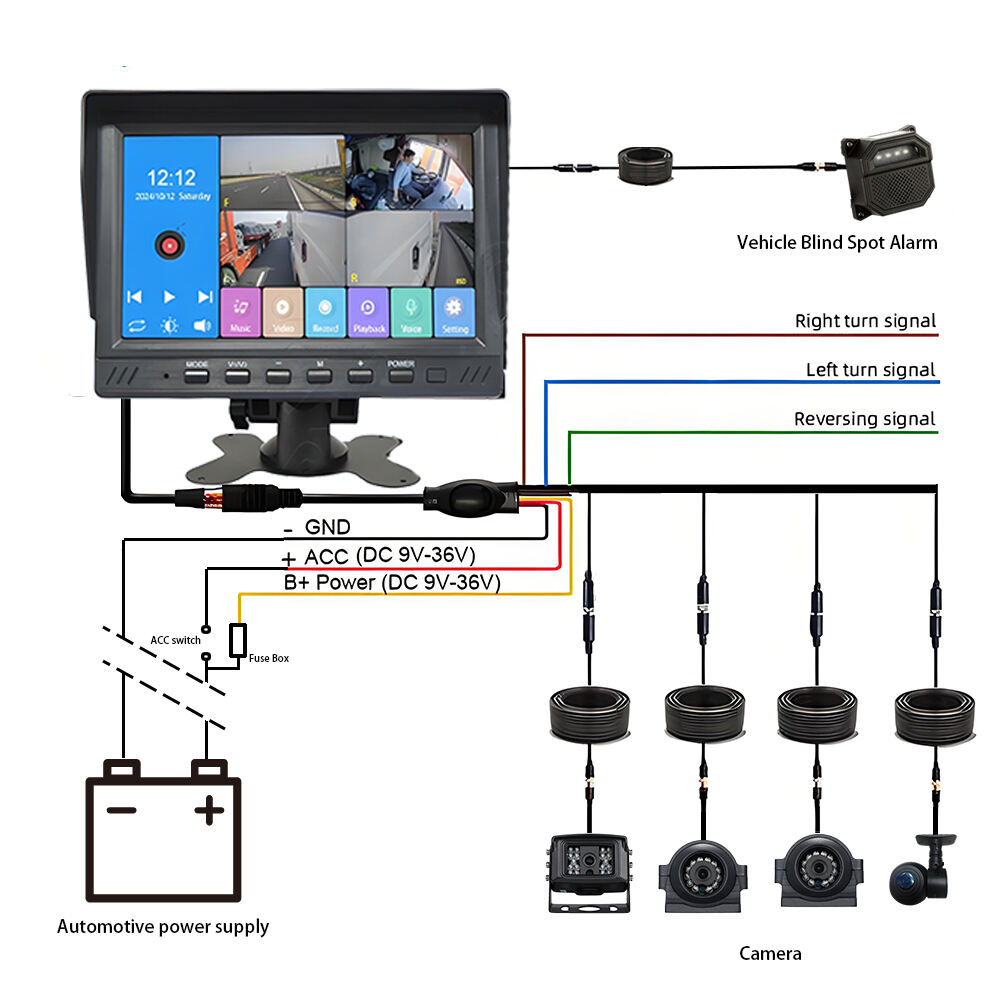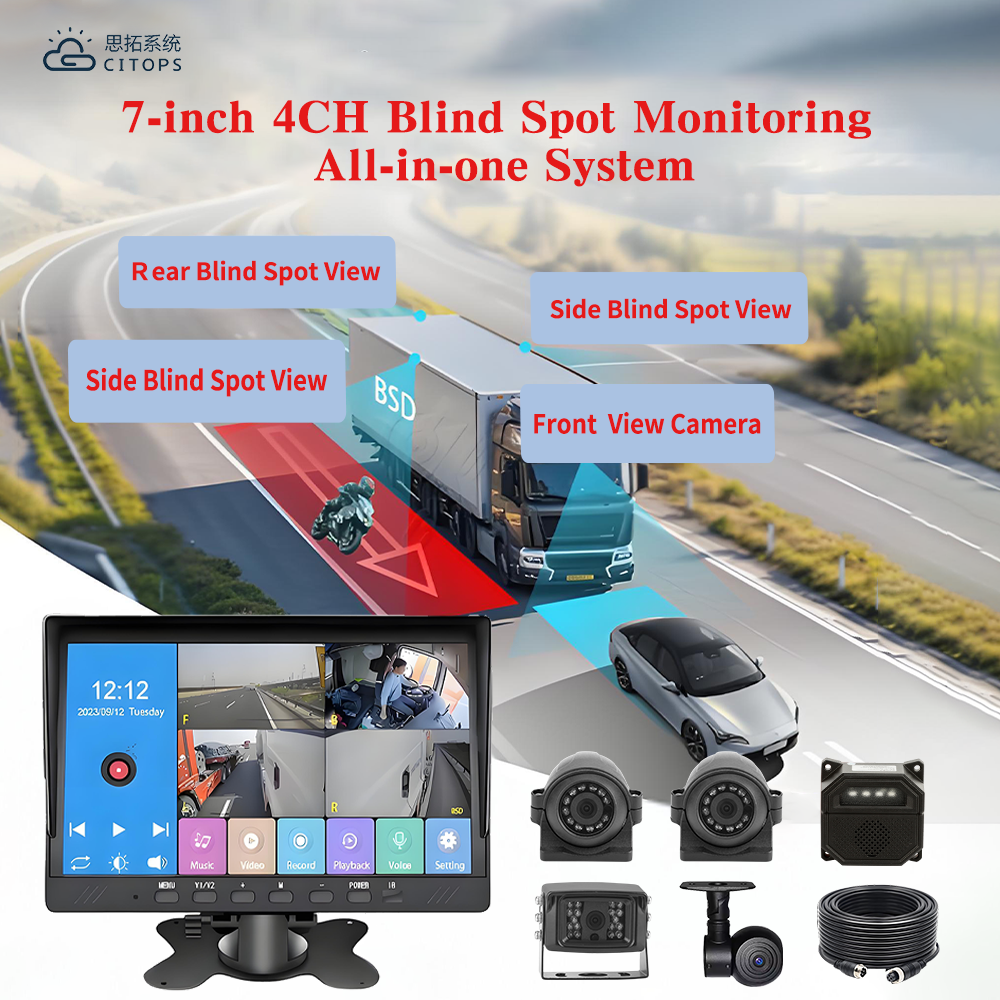Elevating Truck Safety Through Intelligent Monitoring Systems
Large commercial vehicles are essential to modern logistics, but their size and limited maneuverability create significant blind spot challenges. Addressing these issues effectively requires more than just improved driver training or traditional mirrors. This is where a Truck Camera Monitoring System becomes indispensable. By providing drivers and fleet managers with real-time visibility and data, these systems help reduce collisions, enhance operational awareness, and safeguard vulnerable road users.
Key Components of a Truck Camera Monitoring System
Wide-Angle Cameras and Multi-Channel Support
An effective Truck Camera Monitoring System features high-resolution wide-angle cameras positioned strategically around the vehicle. These may include front, rear, and side-view cameras, all connected to a central monitoring unit. Multi-channel support ensures that video streams from various perspectives are recorded and accessible, giving a 360-degree view of the truck's surroundings. This helps eliminate blind spots that traditional mirrors cannot cover.
Real-Time Video Feeds and Driver Displays
Modern truck camera monitoring systems seamlessly integrate into the driver's dashboard, featuring split-screen displays or intelligent dynamic switching to present real-time, blind-spot-free views from multiple onboard cameras.
Real-time video feeds allow drivers to assess adjacent lanes and rear traffic conditions more accurately, especially during lane changes, reversing, or tight maneuvers in urban areas. Some advanced systems also include object detection or proximity alerts, further enhancing safety.
Enhancing Driver Awareness and Road Safety
Lane Change and Turning Assistance
One of the most common causes of accidents involving trucks is improper lane changing or turning, particularly in congested traffic. A Truck Camera Monitoring System addresses this by giving drivers full visual access to side blind zones. When the turn signal is activated, the corresponding side camera feed can automatically appear on the screen, allowing the driver to make safer, more informed decisions.
Pedestrian and Cyclist Detection
In urban settings, pedestrians and cyclists are particularly vulnerable around trucks. Some camera systems are equipped with AI-powered detection tools that can recognize these road users and alert the driver accordingly. This not only helps avoid accidents but also reinforces compliance with urban safety regulations and promotes responsible driving habits.

Integration with Fleet Management Systems
Cloud-Based Video Storage and Retrieval
Our truck camera monitoring systems do not offer cloud storage to avoid server lag. Instead, customers can use their own servers for storage. We provide a cloud service platform that allows for remote monitoring of vehicle activity, real-time video streaming, and vehicle tracking. The recorded footage is stored locally on the customer's storage medium.
This is crucial for investigating accidents, handling insurance claims, and resolving customer disputes. The ability to retrieve high-definition video evidence can significantly reduce liability and improve operational transparency.
Real-Time Fleet Tracking and Data Analytics
In addition to camera feeds, these systems can integrate with GPS tracking, speed sensors, and braking monitors to provide a comprehensive overview of each vehicle’s performance. Fleet managers can analyze this data to identify risky behaviors, optimize routes, and plan maintenance schedules. This fusion of video monitoring and telematics strengthens overall fleet efficiency.
Installation, Maintenance, and Reliability
Compatibility and Customization Options
Not all trucks are the same, and a good Truck Camera Monitoring System should be adaptable to various vehicle types and fleet sizes. Look for systems that allow easy camera placement, support both analog and digital inputs, and are compatible with other on-board technologies. Customization ensures that your monitoring setup aligns with the specific needs of your fleet.
Weatherproof and Vibration-Resistant Equipment
Truck environments can be harsh, so monitoring hardware must be built to withstand tough conditions. Cameras and DVR units should be rated for extreme temperatures, moisture, dust, and constant vibration. Durable systems reduce downtime, lower maintenance costs, and maintain consistent performance in all driving scenarios.
Long-Term Benefits and Operational ROI
Accident Reduction and Insurance Savings
Deploying a Truck Camera Monitoring System has been shown to significantly reduce preventable accidents. With fewer incidents, companies can enjoy lower insurance premiums and reduced claims. Recorded footage can also help exonerate drivers when they are not at fault, protecting both personnel and company reputation.
Improved Driver Training and Accountability
Monitoring systems can serve as valuable training tools. Recorded video can be reviewed to identify mistakes or reinforce best practices. Real-time alerts and reports also encourage drivers to maintain safe driving habits. Over time, this leads to a more accountable and safety-conscious workforce.
Frequently Asked Questions
What Areas of the Truck Do These Systems Typically Cover?
A Truck Camera Monitoring System usually includes front, rear, and side-view cameras, offering complete external visibility around the vehicle.
Can Footage Be Accessed After an Incident?
Yes, most systems include video storage on SD cards or cloud platforms, allowing retrieval of footage for days or even weeks after an event.
Are These Systems Suitable for Older Trucks?
Absolutely. Many camera systems are designed for retrofitting and are compatible with a wide range of truck models and electrical systems.
How Do Monitoring Systems Impact Driver Privacy?
Most Truck Camera Monitoring Systems focus on external environments rather than in-cab footage, maintaining driver privacy while ensuring road safety.
Table of Contents
- Elevating Truck Safety Through Intelligent Monitoring Systems
- Key Components of a Truck Camera Monitoring System
- Enhancing Driver Awareness and Road Safety
- Integration with Fleet Management Systems
- Installation, Maintenance, and Reliability
- Long-Term Benefits and Operational ROI
- Frequently Asked Questions


